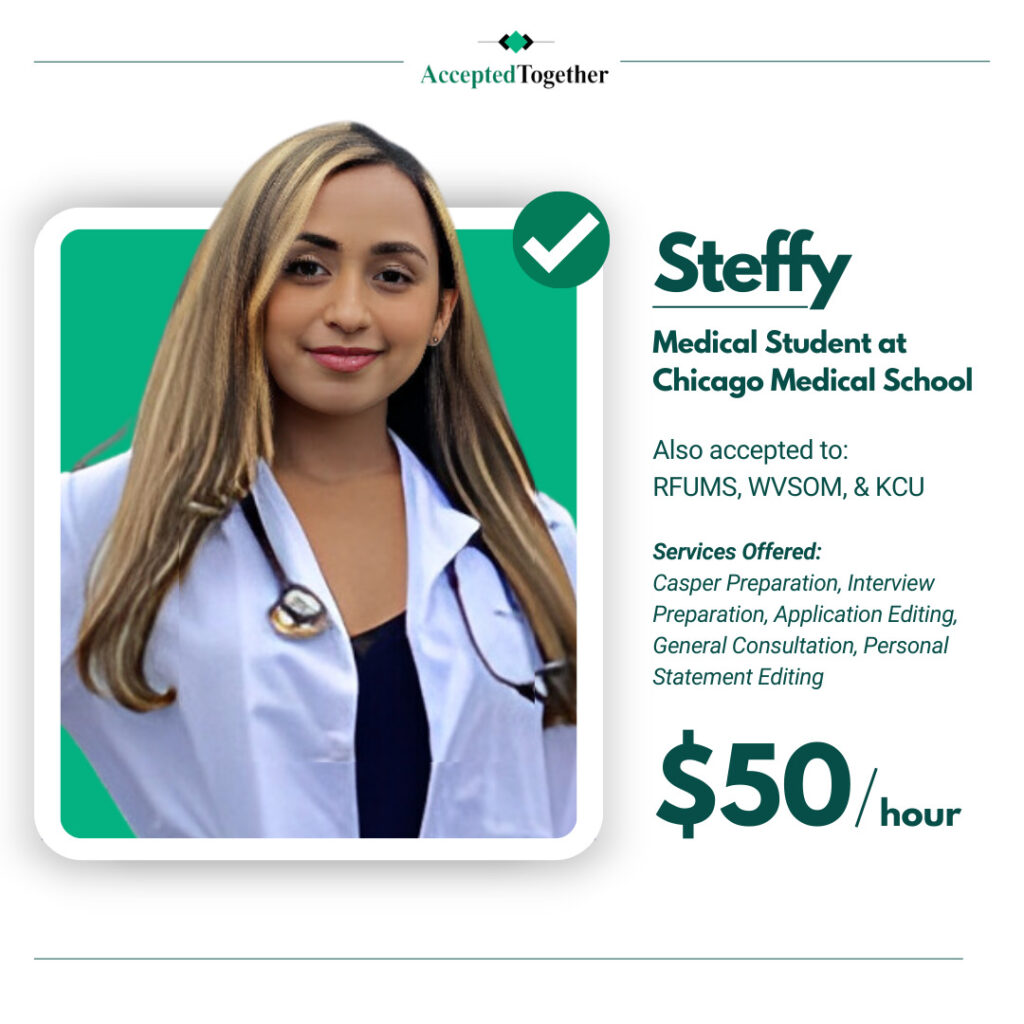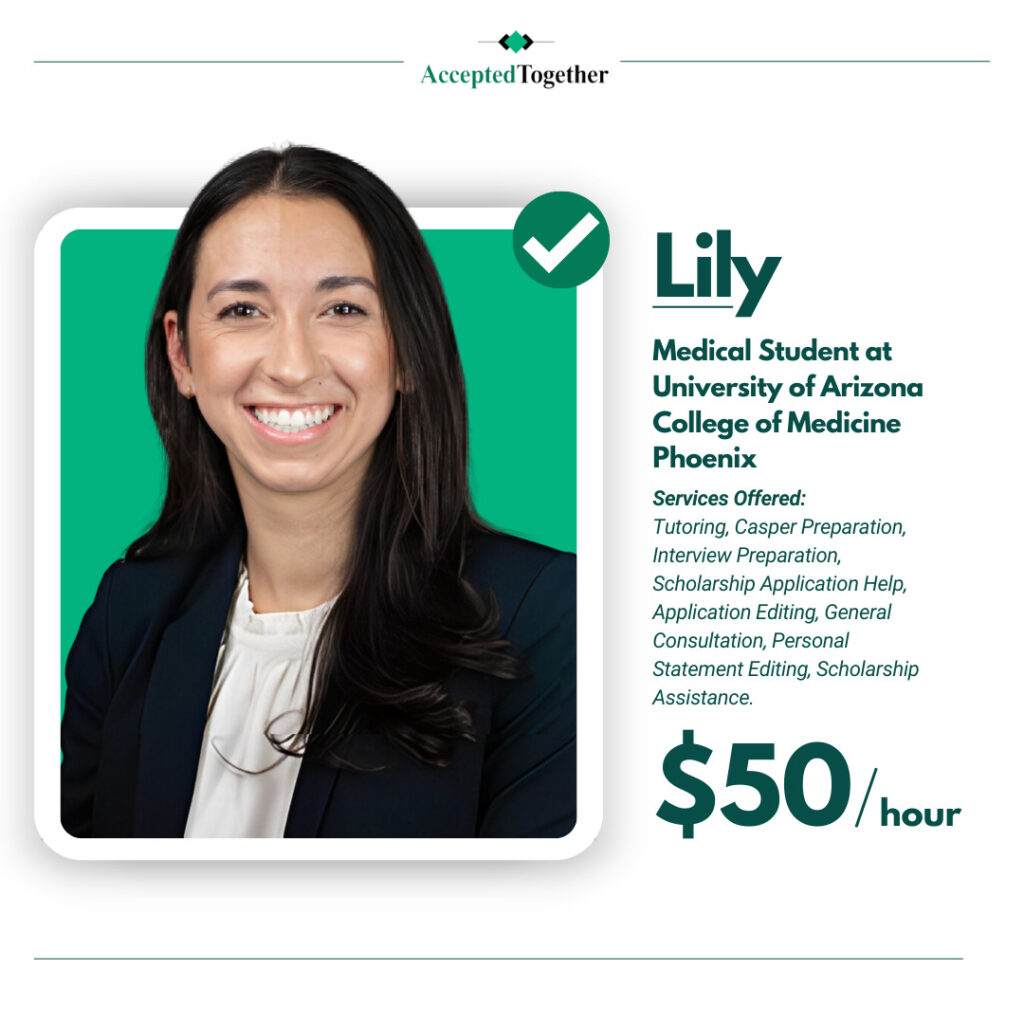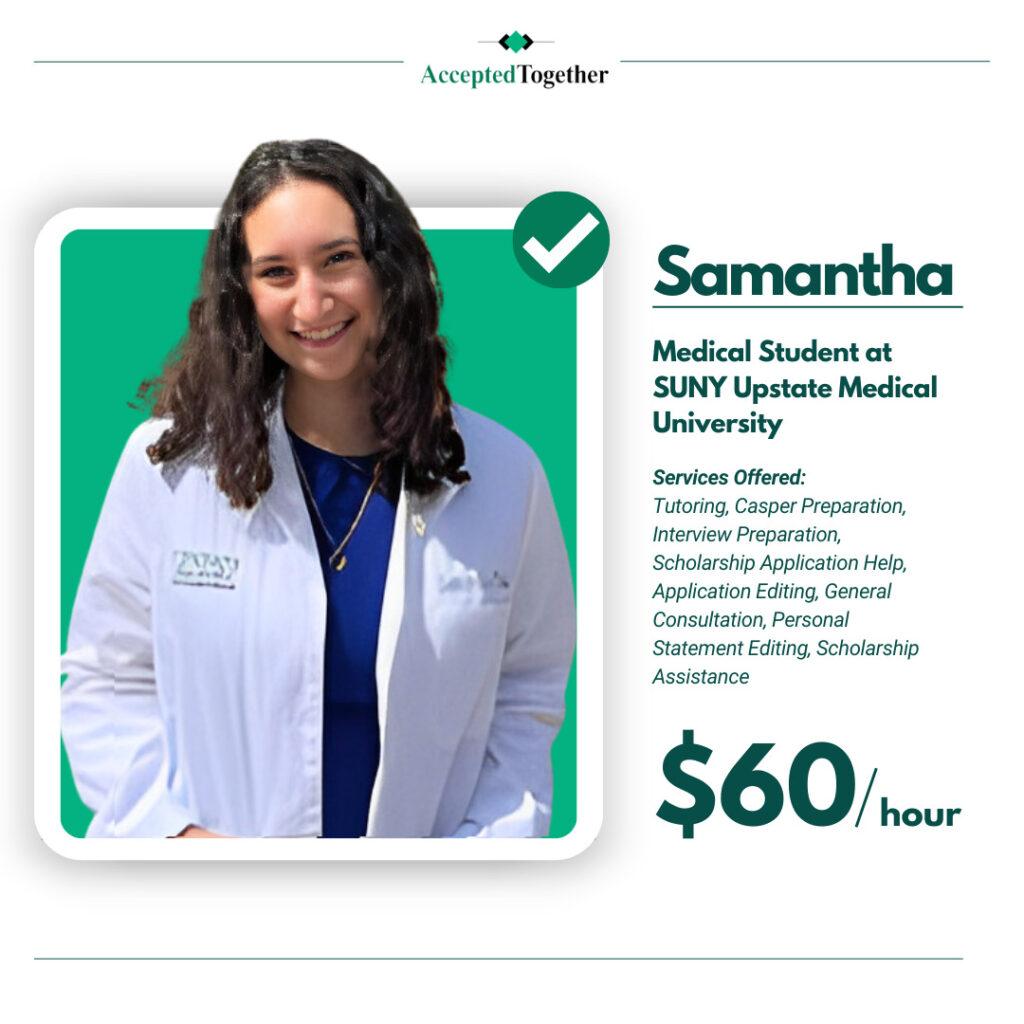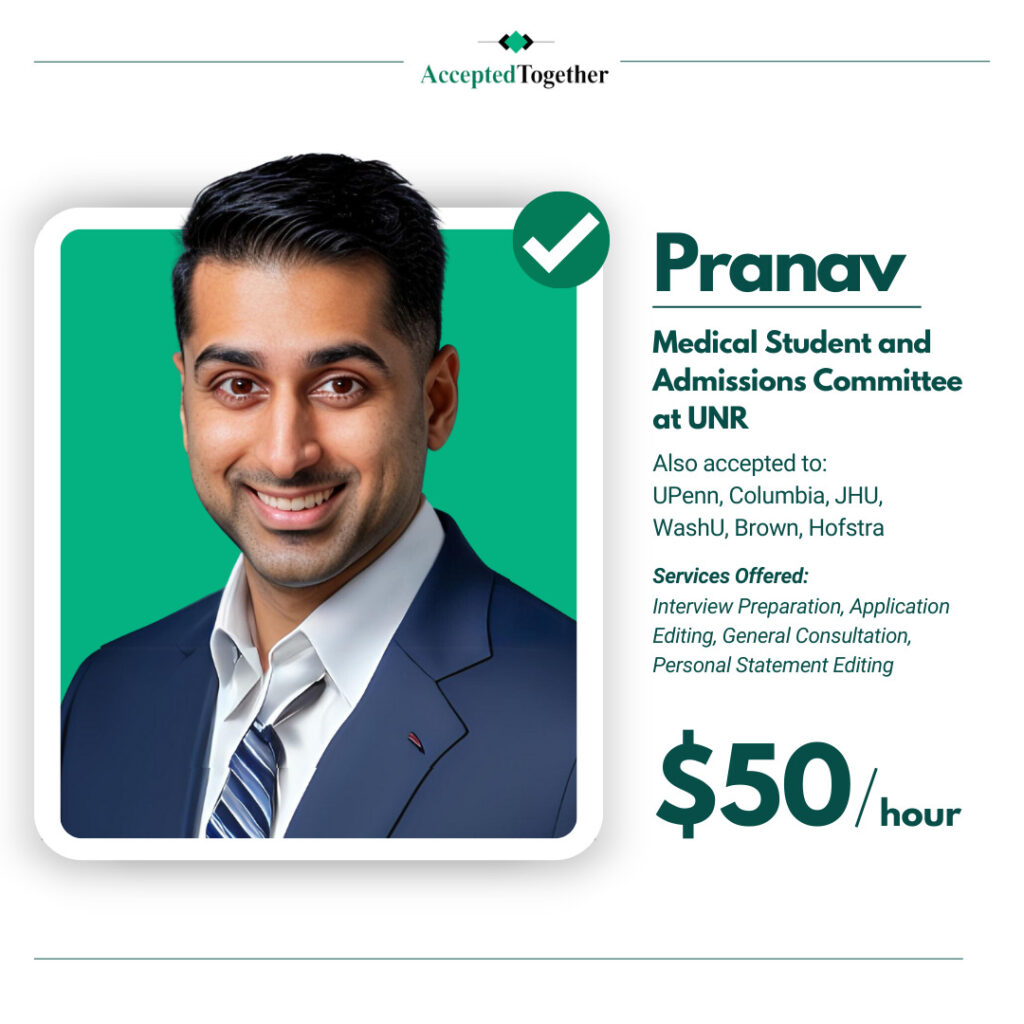YOUR PATH TO SUCCESS STARTS HERE
Find a dedicated consultant to help with applications, personal statements, interviews, Casper, and more!

Embarking on the journey to medical school is an exhilarating adventure, filled with anticipation and determination. Central to this journey is the American Medical College Application Service (AMCAS), the primary application portal for aspiring physicians seeking admission to allopathic medical schools in the United States.
The AMCAS application is more than just a form; it’s a comprehensive showcase of your academic achievements, experiences, and aspirations. With its streamlined approach, AMCAS simplifies the application process, allowing you to submit your grades, MCAT scores, activity descriptions, and personal statement to multiple medical schools with ease. However, navigating the intricacies of the AMCAS application can be daunting. It requires careful planning, attention to detail, and a deep understanding of what medical schools are looking for in their future students. This guide is designed to demystify the AMCAS application process, providing you with step-by-step instructions and tips to help you present your best self to medical school admissions committees.
AMCAS is more than just an application platform; it’s the backbone of the medical school admissions process for a vast majority of U.S. medical schools. Managed by the Association of American Medical Colleges (AAMC), AMCAS simplifies the application for everyone. This unified approach not only saves time but also ensures consistency and fairness in how applications are reviewed by different medical schools.
One of the key features of AMCAS is its holistic approach to presenting an applicant’s profile. Beyond grades and test scores, the platform provides space for a personal statement, where applicants can articulate their passion for medicine, and a section for letters of recommendation, which offer a glimpse into the applicant’s character and potential as seen through the eyes of mentors and educators.
The role of AMCAS in the medical school application process is multifaceted. It acts as a central repository for academic records, ensuring that medical schools receive accurate and verified transcripts. This is crucial for the calculation of GPAs and for assessing the rigor of an applicant’s coursework.
AMCAS also plays a vital role in standardizing the application process. By providing a common format for all applicants, it levels the playing field, ensuring that every candidate is evaluated based on the same criteria. This standardization is particularly important for medical schools, as it streamlines the review process and helps admissions committees focus on the unique aspects of each applicant’s profile.
Furthermore, AMCAS serves as a communication hub between applicants and medical schools. Through its portal, applicants can track the status of their application, receive notifications about missing documents, and stay informed about important deadlines. This centralized communication system helps reduce the stress and uncertainty that often accompany the application process.
In addition to its practical functions, AMCAS plays a strategic role in the medical school application process. It allows applicants to strategically select the schools to which they apply, based on factors such as location, program focus, and admission requirements. This targeted approach helps applicants maximize their chances of acceptance by aligning their application with schools that best fit their goals and qualifications.
Let’s delve into the initial stages of setting up your AMCAS account and understanding the essential components of the application.
The first step in your medical school application journey is to create an AMCAS account. This is your gateway to the application process, and it’s where you’ll manage and submit all your application materials. To register, visit the AMCAS website and look for the “AMCAS Sign In” tab. Here, you’ll be prompted to create an account by providing basic information such as your name and email address. The process is straightforward, and once your email is confirmed, you’ll have access to your AMCAS dashboard. This dashboard is your command center, where you’ll start your application, track your progress, and receive important notifications from AMCAS.
The AMCAS application is comprised of several key components, each playing a vital role in the application to medical schools. Let’s break down these components:
1. Personal Information: This section captures your basic details, including your name, contact information, and demographic data. It’s important to ensure that this information is accurate and up-to-date, as it will be used for communication throughout the application process.
2. Academic History: Here, you’ll enter information about your educational background, including high school and post-secondary institutions attended. You’ll also provide details about your coursework, which is crucial for calculating your GPA. Be meticulous in entering your grades and credits, as any discrepancies can delay the verification process.
3. Work and Activities: This section allows you to showcase your extracurricular involvement, work experience, and other activities that demonstrate your skills and interests. You can list up to 15 entries, and it’s advisable to include a mix of experiences that highlight your leadership, teamwork, and commitment to the field of medicine.
4. Letters of Evaluation: Also known as letters of recommendation, this part of the application is where you’ll list your referees who will vouch for your abilities and character. AMCAS facilitates the collection of these letters, which are then distributed to the medical schools you apply to.
5. Medical College Admission Test (MCAT) Scores: Your MCAT scores are a critical component of your application, and they’re automatically uploaded to your AMCAS account by the AAMC. Ensure that your test scores are up-to-date and accurately reflect your performance.
6. Personal Statement: This is your opportunity to tell your story and explain why you’re passionate about pursuing a career in medicine. The personal statement is a chance to provide context to your application and highlight qualities that aren’t evident from your grades and test scores.
7. School Selection: Finally, you’ll select the medical schools to which you want to apply. AMCAS allows you to apply to multiple schools with a single application, saving you time and effort. Consider factors such as location, program focus, and admission requirements when choosing your schools.
By understanding what’s required and meticulously preparing each section of the AMCAS, you’ll be well on your way to submitting a compelling application to your chosen medical schools.
Tthe academic record and coursework section of the AMCAS provides medical schools with a detailed look at your educational background, including the courses you’ve taken and the grades you’ve earned. Let’s look into how to accurately enter your college coursework and understand the classification of courses and GPA calculation.

Accuracy is key when entering your college coursework into the AMCAS application. Start by gathering all your transcripts from every post-secondary institution you’ve attended. This includes community colleges, summer sessions, and study abroad programs. When entering your coursework, include every course, even if it didn’t contribute to your degree or if you later repeated it. Be sure to list your courses in chronological order and use the exact course titles and grades as they appear on your transcripts.
For each course, you’ll need to provide the following information:
– Course name and number
– Credit hours
– Grade received
– Academic term
– Course classification (e.g., Biology, Chemistry, Physics, Mathematics)
It’s crucial to double-check your entries against your transcripts to ensure that there are no discrepancies. Any errors in this section can lead to delays in the verification process, which could impact your application timeline.


AMCAS classifies courses into different categories to standardize the GPA calculation across all applicants. These categories include Biology, Chemistry, Physics, Mathematics (BCPM), and All Other (AO) courses. The BCPM GPA, also known as the science GPA, is particularly important as it gives medical schools an idea of your performance in pre-medical coursework.
When classifying your courses, refer to the AMCAS Course Classification Guide, which provides detailed instructions on how to categorize each course. For example, a course in human anatomy would be classified under Biology, while a course in organic chemistry would fall under Chemistry. If you’re unsure about how to classify a particular course, consider how your university categorizes it or consult with your University’s pre-health advisor before submitting the AMCAS.
AMCAS will calculate your GPA by converting your grades into a standardized scale. This ensures that your GPA is comparable to those of other applicants, even if your college uses a different grading system. The AMCAS GPA includes all coursework listed in your application, including repeated courses, failed courses, and courses taken for academic forgiveness.
The Academic Record and Coursework section of your AMCAS application is therefore a critical component that requires careful attention to detail. Accurately entering your college coursework and understanding the classification of courses and GPA calculation are essential steps in presenting a clear and comprehensive academic profile to medical schools.
One of the most dynamic sections of the AMCAS application is the “Work and Activities” section, where you have the opportunity to showcase your extracurricular activities, employment experience, and other significant experiences. This section is your chance to demonstrate to medical schools the breadth of your interests, your leadership skills, and your dedication to medicine.
In this section, you can list up to 15 experiences that have been meaningful to you during your pre-medl journey. These can include clinical experiences, research projects, volunteer work, leadership roles, and even hobbies. For each entry, you’ll need to provide a brief description of the activity, your role, the time commitment, and the dates of participation.
When selecting experiences to include, focus on those that have been most impactful to you and that highlight your skills and attributes. Consider the following:
– Clinical experiences: Shadowing physicians, working as a medical scribe, or volunteering in a healthcare setting can provide valuable insights into the medical field.
– Research: Participation in scientific research demonstrates your analytical skills and your commitment to advancing medical knowledge.
– Leadership roles: Positions in student organizations or community groups can showcase your ability to lead and collaborate with others.
– Community service: Volunteer work reflects your compassion and dedication to serving others.
Be strategic in how you present your experiences. Use action verbs to describe your responsibilities and achievements, and quantify your impact whenever possible. For example, instead of saying “Volunteered at a hospital,” you might say “Provided bedside assistance to over 100 patients, improving their comfort and well-being during hospital stays.”
Within the “Work and Activities” section, you have the option to designate up to three experiences as “most meaningful.” This designation allows you to provide an additional narrative about why these activities were particularly impactful and what you learned from them.
When selecting your most meaningful experiences, consider the following:
– Personal growth: Choose experiences that have contributed to your personal development and shaped your understanding of medicine.
– Impact: Highlight activities where you made a significant contribution or difference in the lives of others.
– Relevance to medicine: Emphasize experiences that have reinforced your desire to pursue a career in medicine and have prepared you for the challenges of medical school.
In your narrative, reflect on the lessons learned and the skills gained from these experiences. This is your chance to provide a deeper insight into your motivations for becoming a physician and how these experiences have shaped your journey.
Therefore, this section of the AMCAS application is an opportunity to highlight the diverse experiences that have prepared you for a career in medicine. By carefully selecting and describing your extracurricular activities, work experience, and most meaningful experiences, you can present a well-rounded and compelling picture of yourself to medical school admissions committees.
Letters of evaluation, also known as letters of recommendation, are a crucial component of the AMCAS application. These letters provide medical schools with insights into your character, abilities, and potential as a future physician. Understanding the types of letters accepted by AMCAS and the process for requesting and submitting them is essential for a successful application.
AMCAS accepts various types of letters of evaluation, each serving a different purpose in showcasing your qualifications:
1. Individual Letters: These are written by a single author who knows you well, such as a professor, research supervisor, or physician you’ve shadowed. They should provide a detailed account of your academic abilities, personal qualities, and suitability for medical school.
2. Committee Letters: Some undergraduate institutions offer a pre-health advisory committee that provides a comprehensive evaluation of their pre-med students. A committee letter is a collective endorsement from this group, summarizing your qualifications and experiences.
3. Letter Packets: A letter packet is a compilation of individual letters, usually assembled and submitted by your school’s career or advising center. It allows you to submit multiple endorsements in one package.
4. Professional Letters: For non-traditional applicants or those with significant work experience, letters from employers or supervisors can highlight your professional skills, leadership abilities, and work ethic.
When selecting recommenders, choose individuals who can speak to your strengths and potential from different perspectives. A balanced set of letters from academic, clinical, and research experiences can provide a comprehensive view of your candidacy.
Requesting and submitting letters of evaluation requires careful planning and communication:
1. Request Early: Approach potential recommenders well in advance of the application deadline. This gives them ample time to write a thoughtful and detailed letter.At least 2 months from the time of the application is usually a fair timeline!
2. Provide Information: When requesting a letter, provide your recommenders with your resume, personal statement, and any other relevant materials. This helps them tailor their letter to your medical school aspirations.
3. Explain the Process: Inform your recommenders about the AMCAS process for submitting letters. They can submit letters electronically through the AMCAS Letter Writer Application or via mail using the AMCAS Letter Request Form.
4. Follow Up: Politely follow up with your recommenders to ensure they have submitted their letters. Keep track of which letters have been received by AMCAS through your application portal.
5. Assign Letters: Once your letters are received by AMCAS, assign them to specific medical schools based on each school’s requirements and your relationship with the recommender.
Letters of evaluation are therefore an integral part of the AMCAS application, providing medical schools with a multidimensional view of your candidacy. By understanding the types of letters accepted and following a systematic process for requesting and submitting them, you can ensure that your letters of evaluation strengthen your medical school application.
The personal statement is a critical component of your AMCAS application. It’s your opportunity to tell your unique story, explaining why you want to pursue a career in medicine and what makes you a suitable candidate for medical school. Crafting a compelling narrative and using effective storytelling techniques are key to making your personal statement stand out.
Your personal statement should be more than just a summary of your resume or a list of your achievements. It should weave together your experiences, motivations, and aspirations into a cohesive narrative that captures the essence of who you are and why you’re drawn to medicine.
1. Start with a strong opening: Begin with an engaging hook that captures the reader’s attention. This could be a personal anecdote, a thought-provoking question, or a statement that reflects your passion for medicine.
2. Show, don’t tell: Use specific examples and experiences to illustrate your qualities and achievements. Rather than simply stating that you’re compassionate or dedicated, describe instances where you demonstrated these traits.
3. Connect your experiences to your medical aspirations: Highlight how your past experiences have shaped your desire to become a physician. Make clear connections between your activities, personal growth, and your choice to pursue a career in medicine.
4. Reflect on your journey: Discuss the challenges you’ve faced and the lessons you’ve learned along the way. Reflecting on your journey shows self-awareness and maturity, qualities that are important for a future physician.
To ensure that your personal statement is both engaging and effective, consider the following tips:
1. Be authentic: Write in your own voice and stay true to yourself. Admissions committees want to get to know the real you, so don’t try to fit into a mold of what you think they want to hear.
2. Focus on depth, not breadth: Instead of trying to cover every aspect of your life, focus on a few key experiences that have had a significant impact on you. Delving deeper into these experiences will provide more insight into your character and values.
3. Maintain a positive tone: While it’s important to acknowledge struggles and setbacks, make sure your personal statement has an overall positive tone. Emphasize your resilience, growth, and optimism for the future.
4. Keep it concise: AMCAS limits your personal statement to 5,300 characters, including spaces. Make every word count by being clear and concise. Avoid unnecessary details and focus on the most important aspects of your story.
5. Proofread and revise: Your personal statement should be free of grammatical errors and typos. Read it aloud, have others review it, and revise it multiple times to ensure it’s polished and well-written.
Your personal statement is thus a vital part of your AMCAS application, allowing you to share your personal journey and aspirations with medical school admissions committees. By crafting a compelling narrative and using effective storytelling techniques, you can create a personal statement that resonates with readers and showcases your suitability for a career in medicine.


Embarking on the journey to medical school is an exciting and challenging endeavor, and the AMCAS application is a crucial step in this process. By understanding the various components of the application, from the academic record and coursework to the personal statement and letters of evaluation, you can effectively showcase your qualifications and passion for medicine. Remember, the AMCAS platform is more than just a form; it’s a tool that allows you to present a comprehensive picture of your dedication, experiences, and aspirations to medical schools across the United States.
As you navigate this process, keep in mind the importance of accuracy, reflection, and authenticity in every aspect of your application. With careful preparation and attention to detail, you can craft an AMCAS application that truly represents your unique journey and potential as a future physician.
The AMCAS application process can vary in length depending on the applicant’s readiness and the time of submission. Generally, after submitting the application, it can take six to eight weeks for verification, especially during peak season from June to September. Applicants are advised to be patient during this period and to check their application status regularly.
The AAMC stands for the Association of American Medical Colleges. It is the organization responsible for running the AMCAS (American Medical College Application Service), which is the centralized application service for most U.S. allopathic medical schools.
The AMCAS application requires one primary personal statement, also known as the “Personal Comments” essay. Additionally, for those applying to MD/PhD programs, two additional essays are required: the “Why MD/PhD?” essay and the Significant Research Experience essay. Later on, you will be filling out secondary essays when schools review your application.
The AMCAS personal statement, or “Personal Comments” essay, has a character limit of 5,300 characters, including spaces. This typically translates to approximately one page of single-spaced text in a standard word processing program.
Yes, Harvard Medical School uses the AMCAS application for its admissions process. Applicants applying to Harvard must submit their materials through the AMCAS platform.
The verification process for the AMCAS application can take six to eight weeks, particularly during the peak season from June to September. It’s important for applicants to submit their application early and to ensure that all information is accurate to avoid delays in verification.
A 500 MCAT score is considered to be around the 50th percentile, which means it is an average score. While it is not a low score, it may not be competitive for top-tier medical schools. Applicants should aim for higher scores to increase their chances of acceptance, especially at more selective institutions.
A good MCAT score is generally considered to be 510 or above, which places an applicant in the 80th percentile or higher. Scores in this range are competitive for most medical schools. However, the definition of a “good” score can vary depending on the specific requirements of each medical school.
AMCAS is run by the Association of American Medical Colleges (AAMC). The AAMC is a not-for-profit organization dedicated to transforming healthcare through medical education, patient care, medical research, and community collaborations.